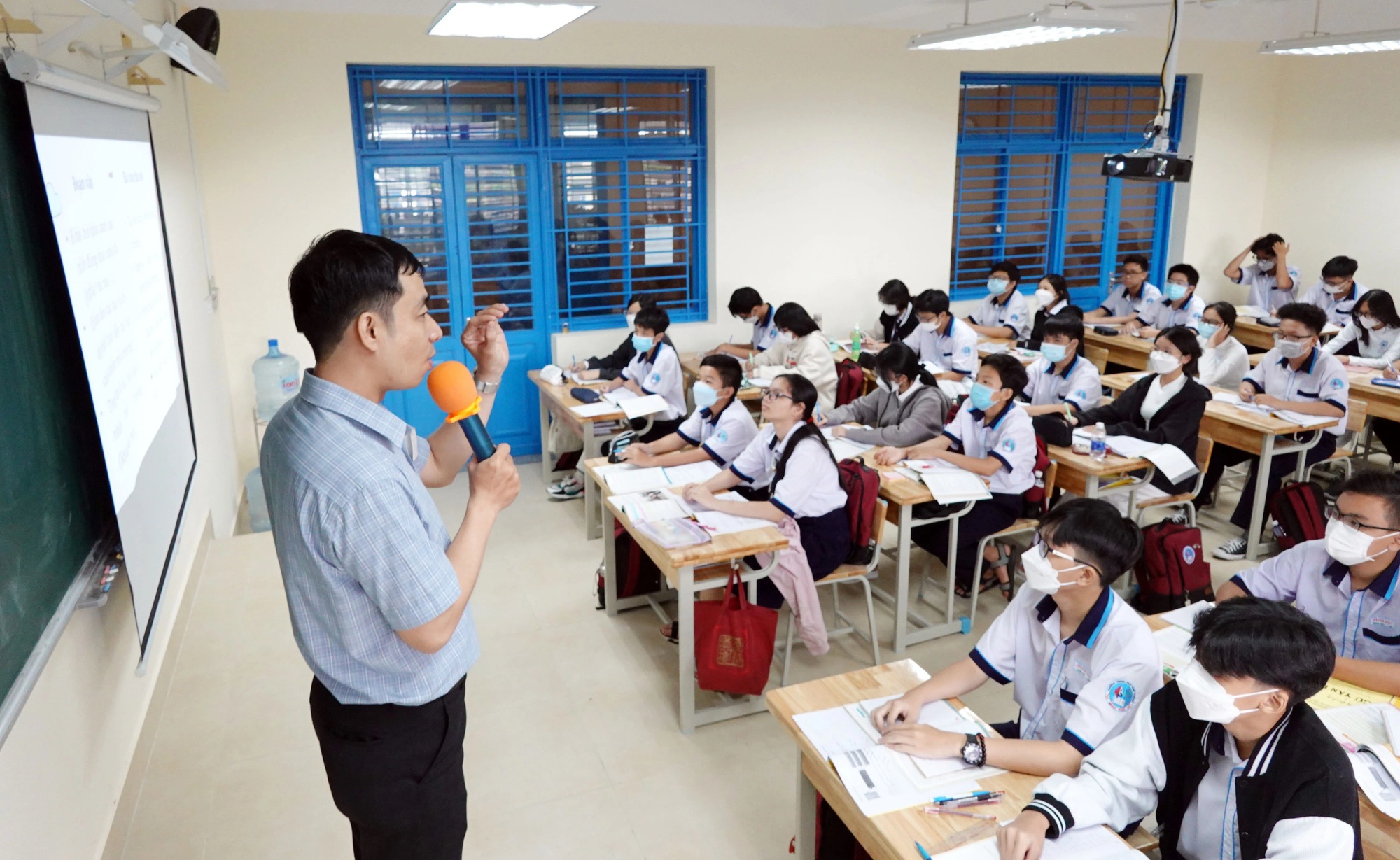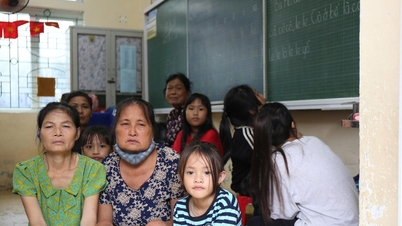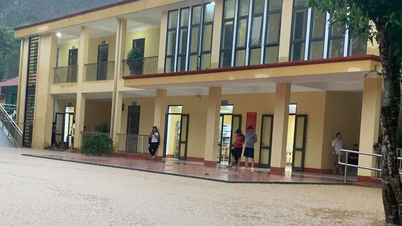If teachers do not know how to control themselves, they can easily get angry when students violate the rules. Although they have studied education and psychology in teacher training college, many teachers still show their power and want to immediately handle those violations.
Therefore, listening always helps teachers know the reasons why students violate. Next is sharing so that students have the opportunity to present their sometimes shallow thoughts because of their immature age and lack of deep understanding.
Imposing comments on students
A very common thing in schools today is that homeroom teachers only base on the comments and evaluations of the subject teachers' lessons and then impose conclusions on the students. Subject teachers often just because a few individuals do not complete their study tasks or follow the rules, or are not polite to the teachers, for example, the whole class suffers.
I once knew a case where a good, well-behaved student in the class accidentally did not complete an exercise the teacher gave on the board and received an unsatisfactory score. When returning to his seat, this student put his notebook down on the table, making a noise. The teacher affirmed that this was an impolite behavior, demanded a reduction in his conduct, and reported to the homeroom teacher to invite the student's parents in to remind him. I tried to tell her that this should only be met privately, to give advice so that the student could correct his mistakes. If necessary, the teacher could remind the whole class to pay attention to behavior that could easily cause misunderstandings for teachers. However, the teacher did not agree.
Before inviting the student's parents, I met them privately and the student honestly said that it was due to personal feelings that he acted that way, and that he was not being disrespectful to the teacher. He admitted his mistake and promised to be more careful. The parents came to the school, and luckily they also admitted their child was wrong, so the incident stopped.

Teachers must know how to control themselves and listen to students (illustrative photo)
Teachers don't want to teach just because of a "rude" student.
Another teacher declared that he would not teach if the class left a student present just because the student smiled at his classmates when he received a bad grade for not knowing the lesson. The teacher felt that he was being disrespected and his honor was hurt, so he had to punish the student. Under pressure from the teacher, the class isolated the student and urged him to leave the class to please the teacher.
It was not until the homeroom teacher found out and intervened that this student was allowed to enter the class. However, the teacher-student relationship was most damaged when the teacher did not interact with this student throughout the school year. Through investigation, I learned that it was the student's forced smile towards his friends because he knew he was a poor student, and did not dare to look down on or be disrespectful to the teacher. Meanwhile, the teacher still insisted that the student did not feel ashamed of being a poor student and that smiling was unacceptable.
Self-control in the face of student violations is a great demand for teachers. If teachers focus on rules and disciplinary measures, it will be difficult for teachers and students to sympathize. Students are growing up and think they understand everything. Sometimes, their actions are to prove their heroic character and fearlessness. Teachers need to find out the root of the violations, analyze, clarify right and wrong, and create conditions for students to change in order to be successful.
Is it wrong to have long nails and paint them black?
I once reminded a female student that having long nails and painting them black was a violation of the rules. This student brazenly replied to me in front of the class: "What's wrong with having long nails? What's wrong with painting them black? None of the teachers said anything. Only the teacher said anything! What about the teacher painting her nails all those colors?"
I was very angry but realizing that the female student was still in her teens, I said: "Let's continue class! Let's discuss this later." The class regained its light atmosphere.
The next day, I met with my colleagues for consultation. Indeed, many teachers did not give me any reminders, so she was right to answer me like that. A female colleague insisted on informing her family and asked her to write a self-criticism. I did not agree.
The homeroom teacher promised to meet with her to get her opinion. Afterwards, she came to see me, admitted her mistake, and promised to change. It is true that because I was the only one giving her opinion, she protested…
Obviously, in resolving student violations, the cooperation of the teacher group is very necessary... If disciplinary measures are imposed on students for every mistake, it is a failure of the teacher. If you want students to behave civilly with teachers, teachers must set an example first.
Teachers are friendly but still serious
In the face of mistakes, the teacher cannot ignore them but needs to give a proper and sincere reminder along with tolerance. Depending on the violation, the level and the impact on the student body, the teacher will determine the form and method of approach to educate the students.
Some teachers leave everything to the homeroom teacher, without caring or understanding the personality, living situation, or learning ability of the students. Teachers who teach subjects but are not homeroom teachers only focus on teaching.
In the face of student violations, it is common for teachers to immediately contact the families and most of them are harsh conclusions, sometimes with imposition and threats of conduct classification. Citing the excuse of lack of time and having to focus on their profession, many teachers only think about discipline without contacting the students and their friends. That is why teachers say one thing and students say another, causing arguments between the school and parents.
A colleague of mine has a rather unique but very effective way of dealing with violations. When students violate the rules, neglect their studies, or have inappropriate behavior towards teachers, the colleague will invite the violating student to identify his/her own mistakes, write them down on a personal page in the teacher's notebook (each student has a separate page), sign and date them, and make a promise and specific corrective actions.
If a student violates the rules for the third time, colleagues will contact the parents to inform them and discuss specific educational measures. The violating student only interacts with the teacher, without informing the class in the spirit of positive discipline, focusing on encouraging and creating conditions for correction. When the parents meet the teacher, everything is clear, so there is no dispute or right or wrong...
Colleagues shared that they absolutely should not impose mistakes but let students realize them themselves after contacting and explaining to them carefully.
Teachers absolutely do not use threatening actions or words when students violate the rules, such as giving poor conduct, sending them to the disciplinary board to force them to stop studying, or inviting them out of the class. These wrong decisions of the teacher will push the students to react more negatively. They may challenge and resist fiercely because they feel hurt in front of their friends.
It is best not to confront the student in the hope of resolving the matter to relieve anger. Instead, the teacher temporarily puts the matter aside and continues to go to class to have the appropriate time to resolve it properly… In addition, students who do good work, are active in studying, practice good conduct and correct mistakes, and make progress are also noted by teachers and informed to the family. This approach is very welcomed by parents.

If teachers behave civilly, every day at school is a happy day for students.
ILLUSTRATION: DAO NGOC THACH
Only by being friendly, sharing, and tolerant of students’ violations can students gain their trust. Here and there, there are still teachers who come into class with a cold face, never smiling or sharing joys and sorrows. There are still teachers who go on social networks with impolite words to colleagues, and are stubborn and prejudiced about students’ mistakes in class… how can they be good examples for students?
If teachers behave civilly, every day at school is a happy day for students and also a happy day for teachers.
Thanh Nien Newspaper opens forum "Civilized behavior in schools"
In response to the controversial behavior of students and teachers at class 7C of Van Phu Secondary School (Van Phu Commune, Son Duong District, Tuyen Quang Province), Thanh Nien Online opened a forum: "Civilized behavior in schools". The forum hopes to receive sharing, experiences, recommendations, and opinions from readers to have a complete and comprehensive view; helping teachers, students, and parents have civilized and appropriate behavior in the current school environment.
Readers can send articles and comments to thanhniengiaoduc@thanhnien.vn. Articles selected for publication will receive royalties according to regulations. Thank you for participating in the forum "Civilized behavior in schools".
Source link


![[Photo] Many streets in Hanoi were flooded due to the effects of storm Bualoi](https://vphoto.vietnam.vn/thumb/1200x675/vietnam/resource/IMAGE/2025/9/29/18b658aa0fa2495c927ade4bbe0096df)

![[Photo] General Secretary To Lam receives US Ambassador to Vietnam Marc Knapper](https://vphoto.vietnam.vn/thumb/1200x675/vietnam/resource/IMAGE/2025/9/29/c8fd0761aa184da7814aee57d87c49b3)
![[Photo] National Assembly Chairman Tran Thanh Man chairs the 8th Conference of full-time National Assembly deputies](https://vphoto.vietnam.vn/thumb/1200x675/vietnam/resource/IMAGE/2025/9/29/2c21459bc38d44ffaacd679ab9a0477c)
![[Photo] General Secretary To Lam attends the ceremony to celebrate the 80th anniversary of the post and telecommunications sector and the 66th anniversary of the science and technology sector.](https://vphoto.vietnam.vn/thumb/1200x675/vietnam/resource/IMAGE/2025/9/29/8e86b39b8fe44121a2b14a031f4cef46)






























































































Comment (0)